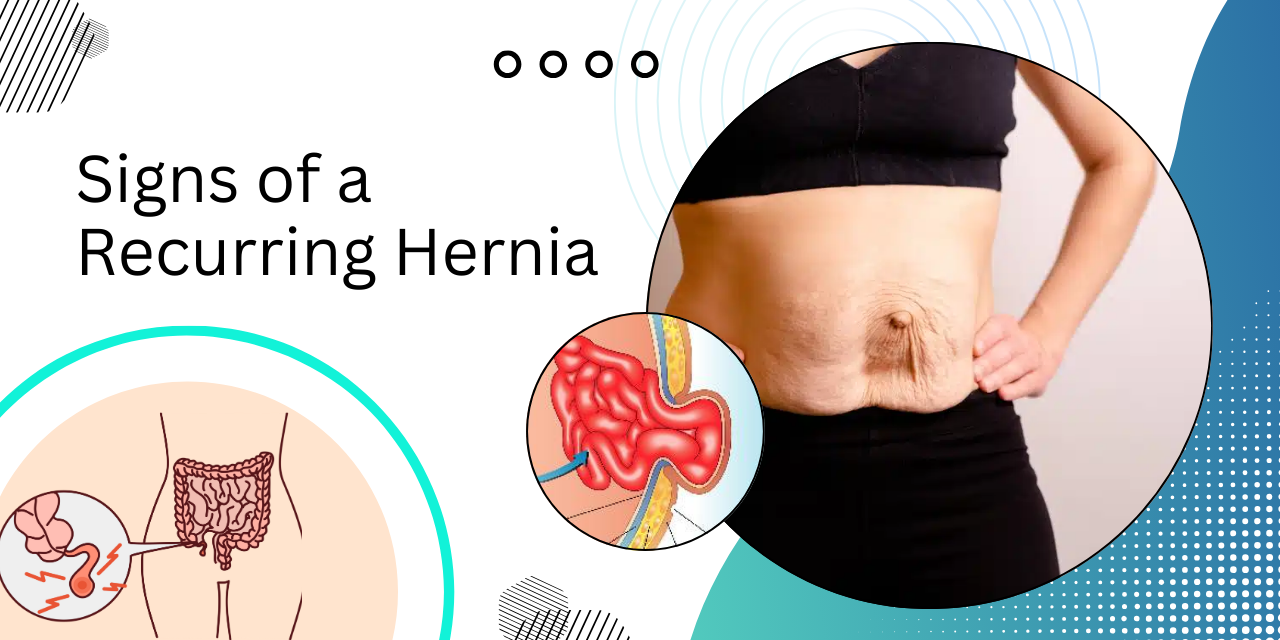A hernia occurs when an internal organ or tissue protrudes through a weak spot in the abdominal wall or surrounding muscle. While hernias can be managed effectively with surgery, there’s always a risk of recurrence. Recognizing the signs of a recurring hernia is crucial for timely intervention and to prevent complications. In this article, we’ll explore the common symptoms that might indicate a recurring hernia and provide essential information on how to address them.
Understanding Hernia Recurrence
A hernia recurrence happens when the original hernia reappears after surgery. This can occur for various reasons, such as inadequate repair, strain on the surgical site, or underlying conditions. It’s essential to be aware of the symptoms to seek prompt medical advice and reduce the risk of further complications.
Common Symptoms of a Recurring Hernia
➾ Bulging or Swelling in the Abdominal Area One of the most noticeable signs of a recurring hernia is a bulge or swelling in the abdominal area, particularly at the site of the previous hernia. This bulge may become more prominent when you stand, cough, or strain and may reduce or disappear when you lie down.
➾ Pain or Discomfort Persistent pain or discomfort around the hernia site is another common symptom. The pain can vary from mild to severe and may be accompanied by a feeling of pressure or heaviness. You might experience increased pain during physical activities, lifting heavy objects, or even when sneezing or coughing.
➾ Changes in the Size of the Bulge If you notice that the bulge is increasing in size or becoming more noticeable over time, it could indicate that the hernia is recurring. Monitoring any changes in the size and shape of the bulge is essential for evaluating the progression of the condition.
➾ Tenderness or Sensitivity The area around the hernia may become tender or sensitive to touch. This tenderness is often a sign of inflammation or irritation and should be evaluated by a healthcare professional to determine if the hernia is recurring.
➾ Digestive Issues In some cases, a recurring hernia can cause digestive problems such as nausea, vomiting, or changes in bowel habits. These symptoms may occur if the hernia is affecting the digestive tract or causing obstruction.
➾ Feeling of Fullness or Pressure A recurring hernia may cause a sensation of fullness or pressure in the abdominal region. This feeling is often accompanied by discomfort and can impact daily activities and overall quality of life.
When to Seek Medical Attention
If you experience any of the symptoms mentioned above, it’s crucial to seek medical attention as soon as possible. For effective hernia treatment in Jalandhar, your healthcare provider will conduct a thorough examination, which may include imaging tests like an ultrasound or CT scan, to diagnose the recurrence and determine the appropriate treatment.
Preventing Hernia Recurrence
Preventing a hernia recurrence involves taking steps to strengthen the abdominal muscles and avoid activities that may strain the surgical site. Here are some tips:
- Follow Post-Surgery Instructions: Adhere to the guidelines provided by your surgeon, including activity restrictions and wound care.
- Maintain a Healthy Weight: Excess weight can increase the risk of hernia recurrence. Aim for a balanced diet and regular exercise.
- Avoid Heavy Lifting: Refrain from lifting heavy objects or engaging in strenuous activities until you receive clearance from your healthcare provider.
- Strengthen Abdominal Muscles: Engage in exercises that strengthen the abdominal muscles, but consult your doctor before starting any new exercise regimen.
Conclusion
Being aware of the common symptoms that indicate a recurring hernia is essential for early detection and effective management. If you notice any signs of recurrence, don’t hesitate to consult your healthcare provider, Dr. Sunil Malhotra at Malhotra Hospital & Orthopedic Centre for a thorough evaluation. Taking preventive measures and following medical advice can help minimize the risk of recurrence and support your overall health and well-being. For more information or to schedule an appointment, please contact us at +917302217302.

